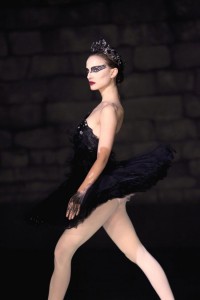A mind apart
Throughout much of Black Swan, the new psychological thriller from director Darren Aronofsky (The Wrestler), Natalie Portman speaks barely above a whisper, as if the sound of her voice might offend anyone who hears it.
As Nina, the young ballerina cast as the lead in a reimagining of Swan Lake, Portman is soft and fragile, a far cry from the manic pixie dream girls she played in Garden State or Closer.
Nina’s problem, as she’s told repeatedly, is that she needs to loosen up. She’s frigid and cold, a product of her own insecurities. To fully embody the dual lead role of Swan Lake as the white swan who loses her lover, and the black swan who tempts him, she needs to get in touch with her dark side.
At its heart, Black Swan is a film about a woman who finds her inner beauty in the worst possible way.
Like The Wrestler before it, Black Swan focuses on an athlete intensely dedicated to her craft, even when it begins to affect the rest of her life.
Nina eats grapefruit and a poached egg for breakfast. Her ankles crack and pop, beat down from years of abuse. In one scene, she refuses herself a celebratory slice of cake, a sign that she strives to stay unhealthily thin, as many dancers do.
When the director of the ballet company, Thomas (Vincent Cassel), decides he needs a new star to headline his revamped Swan Lake, he casts Nina. He has his misgivings. He’s seen a glimmer of simmering sexuality inside Nina that he regards as necessary for the role, but she can’t seem to reconnect with it.
When Lily (Mila Kunis) moves from San Francisco and joins the company, Nina begins to worry that the new dancer is vying for her spot. As Nina battles her own shortcomings, paranoia sets in, leading her to a series of hallucinations, losing her grip on reality.
Black Swan isn’t the most original story. It features plenty of cheap “Gotcha!” scares, and a boatload of “Wait, was that real?” moments.
It operates in the same area as this year’s earlier movie Shutter Island which also revolves around a character coming to grips with his own mind, and, like Black Swan, it didn’t break any new ground in the genre.
What set Shutter Island apart from other films were its stunning Hitchcock-inspired visuals and a gripping performance by Leonardo DiCaprio. Aronofsky and Portman save Black Swan from its familiar story in the same way.
For Black Swan, Aronofsky reteams with Matthew Libatique, who worked as cinematographer on Pi and Requiem for a Dream. It’s a welcome reunion.
Aronofsky almost exclusively employs handheld cameras in his films, a technique that no doubt harkens back to his New York indie roots, when he didn’t have the time to do anything complicated with the camera or have the money to afford a tripod.
Sometimes, as with The Wrestler, it gives his films a cheap look. Here, Aronofsky and Libatique use the handheld camera to great effect. It allows them to be fluid, quick and, like their subjects, balletic.
Aronofsky sometimes risks overdoing his visuals. As would be expected from the play within the film, the art design contrasts black and white imagery. Most of the sets are painted in these two colors, and in some scenes, Nina wears white clothes, while everyone else wears black.
It lacks any subtlety, a bang-you-over-the-head reminder of Nina’s internal conflict. But Aronofsky redeems himself with his direction. When paired with Clint Mansell’s powerful score, Libatique’s lens elevates a run-of-the-mill story to a fierce, terrifying foray into a fractured mind.
Ultimately, however, this is Portman’s moment. The rest of the cast works well. Kunis’ beach-girl delivery suits the unrestrained Lily, and there is no better actor to play a French jerk than Cassel. Barbara Hershey as Nina’s mother might have created the creepiest on-screen mom since Piper Laurie in Carrie.
But it’s Portman who soars. Without a doubt, she’ll be an Oscar contender this year — and deservedly so. In discovering Nina’s black swan, she finds a side she’s never shown audiences before, and one the audience will find it hard to forget.
Black Swan is a testament to Aronofsky and Portman’s respective skills. Through their delicate work, they took a potentially familiar story into a stylistic exploration of the mind.


It sounds like you’re trying to go out of your way to be overly critical of a brilliant film to sound smart, but instead, you just sound pretentious.